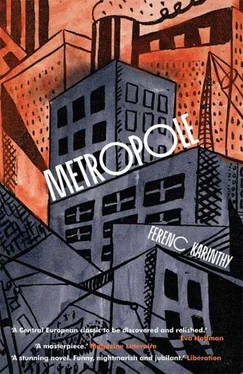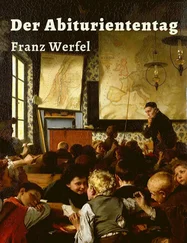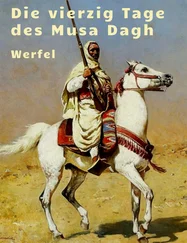They went on to ask him something that might have been his name and he gave it to them together with his home address, though whether they understood this when he wrote it down he could not tell. He had no idea what they were going to do with the information. Nor did he have to pay, or at least no one indicated that he should. The next patient was already there behind him and as soon as he rose from the chair the other occupied it, the new man’s place being immediately taken up by someone else. On the way out he decided to take a different route but was so relieved to be rid of his pain that he got lost. He wandered along criss-crossing corridors, down stairs, meeting dense crowds everywhere, the air thick with hospital smells. There were ever new corridors, twisting and turning erratically, now cutting across an open courtyard under glass. The building seemed to be comprised of various parts of different periods, one added after another. Eventually he arrived in a spacious circular hall.
It must have been the maternity department. There were hundreds and hundreds of little cots in rows with babies wrapped in white swaddling bands. The newly born, like the rest of the city’s inhabitants, represented the whole gamut of races with every type of physiognomy, from the palest white to the darkest black. They filled not only this hall but the next and the one after that too, baby after baby, white, black, brown, yellow, all the way down the corridor as well, in cots that did not fit into the main halls. There were a few multiple cots, two or three in some wards, designed for twins perhaps or simply babies for whom there was no room elsewhere. And there were more extensions just as packed with infants, and still more after those as if there could be no end of them, and all the while nurses in white gowns were pushing trolleys with yet more babies, those who presumably had just been delivered in surgery, in groups of ten or twenty, all red and furiously bawling after their entry into the world… Budai liked children and was generally touched by them but he had never seen so many all together and the sight confused and terrified him. He looked to escape, seeking an exit from the clinic. He was losing patience, wanting to see no more babies, worrying what would happen when the present batch grew up and joined the already teeming hordes in the streets.
Arriving back at the hotel, he found Bebébe in the lift. She immediately noticed his swollen face and looked at him as if to say he should not get out but continue up to the eighteenth floor. Once up there Budai tried to convey to her that he had had a tooth pulled and even opened his mouth to show her where. In examining it Vevede had to come so close that her blonde hair tickled his chin and he could feel the girl’s skin and breath; later he tried to recall whether it mattered who started stroking whose face first, who kissed who, and whether it was she who first offered up her face and lips. Budai’s mouth was still swollen and numb with the anaesthetic or perhaps it was his cut gum that was in the way. In any case he felt awkward and lumpen, hardly capable of sensation, and he might have been a little dizzy too since all this passed in a kind of fog. Meanwhile the lift buzzer started ringing so they had to go down and once it started to crowd up everything that had passed upstairs seemed distant and unreal.
But this did nothing to solve his financial problem. He had to find work, anything, to earn some money. But how and where would he find work? Who could direct him to an employer? After all, he had failed to elicit much simpler information from local people. Ironically, the longer he stayed here the less he found himself able to ask people things. There was nothing he could do about that, however often he had vowed to change: reticence and withdrawal were necessary forms of self-preservation in the face of so many failures and disappointments. He was becoming ever more confused and detached in his dealings with others, ever less willing to accost people in the street or anywhere else and when he did try to make contact he became almost speechless. It was as if he was frozen. Maybe that is how it had to be. Maybe that was the only way his personality, his constitution could deal with the situation.
Then he remembered that first Sunday when he passed the market and somebody shouted at him as if inviting him to work. It was the driver of the truck who wanted help unloading vegetables, so he found the cheapest items among his clothes, the more worn of his two pairs of shoes, those that had been practically walked to pieces on his various excursions, and the pullover that he had carried in his briefcase. He put them on and set out.
It took him some time to find the open market. He got out at the same underground station as before but had twice crossed the enormous square before realising that, this being a weekday, there were no stalls or booths, no folding tables set out with goods, that the square had in fact been swept clean and that in the centre stood a statue of a wounded soldier wielding a rifle. Might it have been a war memorial? The outdoor market, it seemed, was only here on Sundays or other public holidays. On the other hand, the covered market-hall at the far end with its glazed and barred stalls was busier than ever. A great army of customers poured in through the front while the big ramp at the side was busy with cranes, conveyor belts and people loading and unloading goods. There were casual labourers everywhere swarming around trucks that were parked nose to tail, ragged figures carrying bales, ice and boxes into the building.
It was easy mingling with them. They seemed to be working in improvised gangs on this or that load. All you had to do was to watch where the next laden truck arrived, get over there, offer your back and someone would immediately give you a sack to carry. His sack seemed likely to contain potatoes or onions, nothing particularly heavy. He followed the others inside with it and threw it onto a great pile of sacks like the rest, then returned for another sack. No-one asked him for any ID or other paperwork and, having addressed one or two questions to him that he couldn’t answer, they assumed he couldn’t speak the language and took hardly any more notice of him. There was not much for them to say in any case: his task was obvious and needed no explaining. Nor did the other temporary porters bother with him, being busy with their own affairs. Quite possibly they were strangers to each other too.
Budai was not scared of physical work. When he was a student on a grant he would occasionally take such jobs when short of money, doing all-night stints at Les Halles in Paris or at Covent Garden in London. His constitution was still strong and healthy and he found himself enjoying the effort and exercise. The only thing he didn’t like was the sacks making his hands and pullover dirty. It took roughly an hour and a half to finish unloading the consignment at which point the driver paid them by pressing a single piece of lowest denomination paper money into their palms. Later he was set to carrying sides of pork, frozen goods, icy and damp to the touch, his back cold, his palms greasy and sweaty. Then it was passing the load from a truck, handing down cages of fat angora rabbits, the kind he had seen in the hotel room whose door he had opened. He earned altogether eight notes in the day plus a little change. He felt a pleasant tiredness and a certain pride too that here he was, making a living with his two bare hands. But at the same time he could hardly wait to get back to the hotel bathroom and a nice hot shower.
From then on each time he went to the market, whatever time of day, he almost always found some work of this kind. No-one ever asked him who he was. When he worked in the evening or at night he noticed that those who had packed up did not go far but entered the liquor store next door. Others simply lay down where they were among the bales, sleeping on empty sacks or in one of the larger crates in some quiet corner. They must have been tramps and homeless people, their clothes filthy and neglected, their whole appearance uncared for. This was the company he was now reduced to.
Читать дальше












